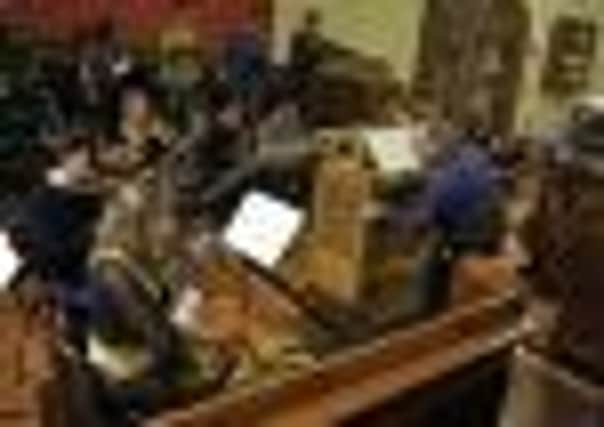Classical: Lessons well learned


OVER the past few years the future of the Dunedin Consort has hung in the balance. Issues with funding, problems in securing adequate management, and maybe even a hint of an identity crisis have combined to make life less than straightforward for the 15-year-old ensemble.
The irony is that the Consort’s achievements during such a period have been supreme, particularly in recording, where co-director John Butt’s specialism in the music of the Baroque have led to award-winning recordings of Handel (Messiah and Acis and Galatea) and Bach (the St Matthew Passion and B minor Mass), on the Glasgow-based Linn label.
Advertisement
Hide AdAdvertisement
Hide AdThe accolades ranged from Gramophone and Midem awards in 2007 for Messiah, to Best Recording of 2008 by High Fidelity magazine for the St Matthew Passion.
In the past 12 months alone, Gramophone magazine ranked the Dunedin as No 11 in its Top 20 choirs of the world, placing it above King’s College Cambridge and the Tallis Scholars. And when BBC Music magazine issued a special publication on The Great Composers, both these eye-opening discs were cited among the definitive recordings of all time.
Yet this is a professional ensemble that just over a year ago, to quote Butt’s co-artistic director Susan Hamilton, “overlooked getting its funding application in to Creative Scotland in time”, which left it bereft of a substantial domestic performance season, and many of us wondering what future the group had in the long term.
“In retrospect, it was a wake-up call,” says Hamilton, who co-founded Dunedin 15 years ago with her then fellow artistic director Ben Parry. “Basically it gave us time to look more closely at the overall structure of the group, and what it needed to function both artistically and administratively.”
It had been clear for some time that Dunedin was changing its colours. What had begun as a professional a cappella ensemble under the twin vocal expertise of Parry and Hamilton – exploring choral repertoire from the Early Renaissance to specially commissioned works – was, with the more circumspect talents of Butt, spreading into Baroque music with a significant period instrumental input. So while the group limped forward financially and with a fragmented concert series, there was this astonishing paradox, where successive major recordings continued to flourish, attracting global recognition. Dunedin managed this largely through public subscription, a formula that continues to work, with two major recordings awaiting imminent release, and a further two scheduled for 2012.
Creative Scotland, in response to the Consort’s application for twice as much as it envisaged asking for last year, and in recognition of its expanding educational work, has responded with a grant of £80,000. “This is brilliant news,” says Hamilton. “We can really develop the group now that we have the resources to fund an office and the necessary administrative support.”
Dunedin has already secured the services of Alfonso Leal del Ojo as general manger, a former manager of the Irish Baroque Orchestra, now doubling as a Dunedin viola player.
Advertisement
Hide AdAdvertisement
Hide AdAnd a celebratory 15th anniversary season is on the cards to re-establish the group’s live profile, and place its specialist instrumental ensemble on an equal footing with the vocal group.
This gets properly under way in January, with the first of three concerts in Edinburgh coupling Bach’s virtuoso Brandenburg Concertos with such notable cantatas as the beautiful Actus tragicus. Dunedin is already on the road, with concerts in Haddington last night and Perth tonight, that feature two of the constituent cantatas from Bach’s Christmas Oratorio alongside Brandenburg Nos 1 & 5.
At a rehearsal this week, I witnessed the razor-sharp dynamic that is shaping the new-look Dunedin. Butt works fast, spitting out wit and wisdom which the singers and players pick up with instant results. Evident too was a quality of orchestral playing that is as vital and stylistic as Dunedin’s trademark vocal ensemble.
“This has come naturally out of our extensive work on the great choral works of Bach and Handel,” Butt says, as he prepares to follow up this week’s concerts with next Tuesday’s annual Messiah at the Queen’s Hall. “The instrumental ensemble has become so distinctive in itself that doing something as virtuosic as the Brandenburgs seemed a logical next step. They are world-class players and there’s no better way of showing them off.”
In April, Butt turns the Dunedin spotlight on Monteverdi’s Vespers with a potentially spectacular performance in Glasgow’s Kelvingrove Museum that uses the galleries and ringing acoustics to simulate the sonorities of St Mark’s, Venice.
That’s just after the Consort returns from Eisenach, Bach’s birthplace, where it will open the 2012 Thuringia Festival with a performance of Bach’s St John Passion. Both that and the Brandenburgs will be recorded next summer.
So it looks as if good times lie ahead, and that the past few years of repositioning are about to pay off.
Advertisement
Hide AdAdvertisement
Hide Ad“We are taken very seriously for our interpretations of 17th and 18th-century repertoire,” says Butt. “But we are still intent on maintaining our choral nucleus, which is a useful medium for touring around Scotland. It’s true to say that my presence has changed the accent of the group, but I see that more as a logical expansion than a radical sea-change.”
• The Dunedin Consort performs Bach at Perth Concert Hall tonight, and presents its annual Handel’s Messiah in the Queen’s Hall, Edinburgh on 20 December. Information on the 15th Anniversary Brandenburg Concerto Series is at www.dunedin-consort.org.uk